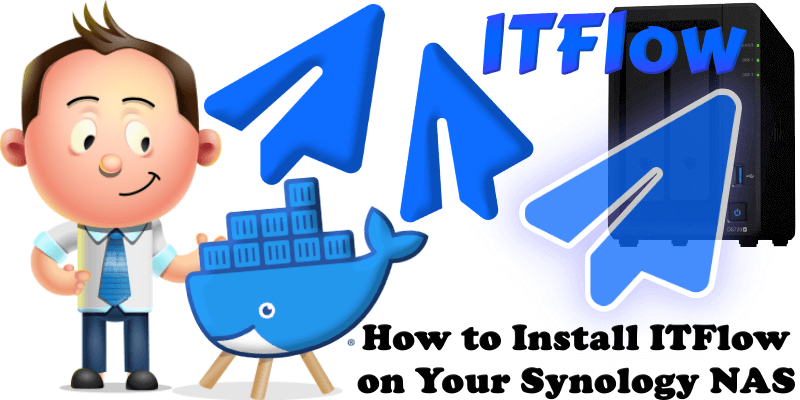
ITFlow is a free, open-source platform designed for Managed Service Providers (MSPs), offering a comprehensive ERP solution for IT documentation, ticketing, and billing. It serves as a centralized hub for managing client information, including contacts, locations, vendors, assets, licenses, domains, and documents, streamlining operations and boosting client satisfaction. Key features include an efficient ticketing system for IT support, advanced invoicing with recurring invoices, quotes, automated reminders, and Stripe payment integration, as well as robust accounting for tracking expenses, income, payroll, and assets. In this step by step guide I will show you how to install ITFlow on your Synology NAS using Docker and Portainer.
This guide works perfectly with the latest ITFlow v25.12 release.
STEP 1
Please Support My work by Making a Donation.
STEP 2
Install Portainer using my step by step guide. If you already have Portainer installed on your Synology NAS, skip this STEP. Attention: Make sure you have installed the latest Portainer version.
STEP 3
Make sure you have a synology.me Wildcard Certificate. Follow my guide to get a Wildcard Certificate. If you already have a synology.me Wildcard certificate, skip this STEP.
STEP 4
Go to Control Panel / Login Portal / Advanced Tab / click Reverse Proxy. Follow the instructions in the image below.
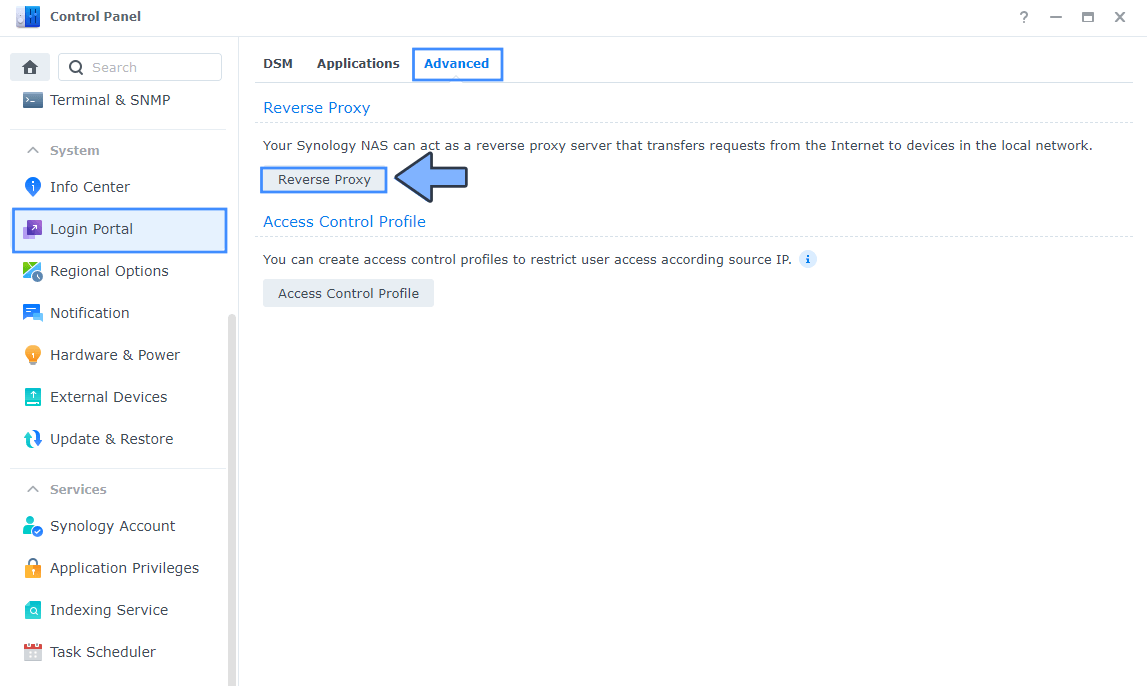
STEP 5
Now click the “Create” button. Follow the instructions in the image below.
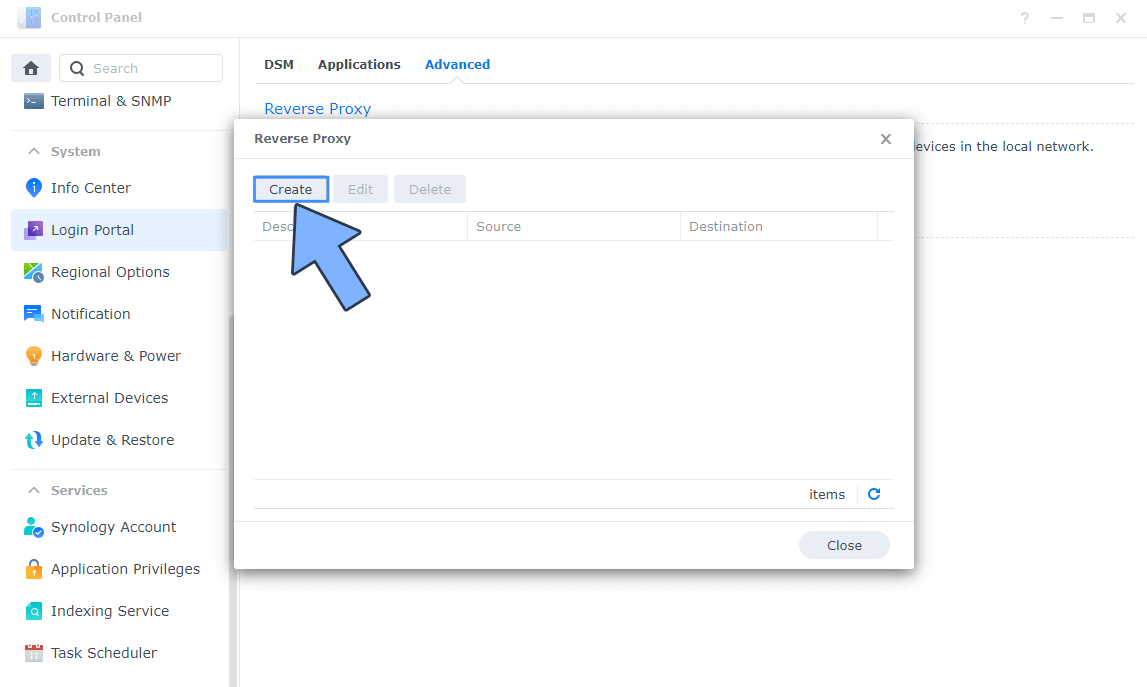
STEP 6
After you click the Create button, the window below will open. Follow the instructions in the image below.
On the General area, set the Reverse Proxy Name description: type in ITFlow. After that, add the following instructions:
Source:
Protocol: HTTPS
Hostname: itflow.yourname.synology.me
Port: 443
Check Enable HSTS
Destination:
Protocol: HTTP
Hostname: localhost
Port: 8990
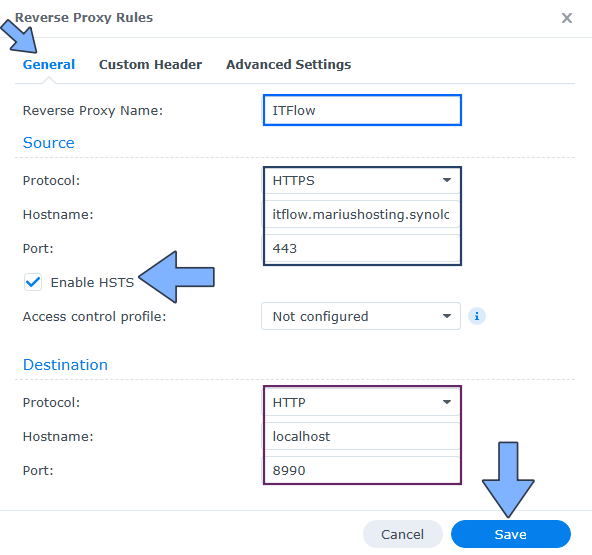
STEP 7
On the Reverse Proxy Rules, click the Custom Header tab. Click Create and then, from the drop-down menu, click WebSocket. After you click on WebSocket, two Header Names and two Values will be automatically added. Click Save. Follow the instructions in the image below.

STEP 8
Go to Control Panel / Network / Connectivity tab/ Check Enable HTTP/2 then click Apply. Follow the instructions in the image below.
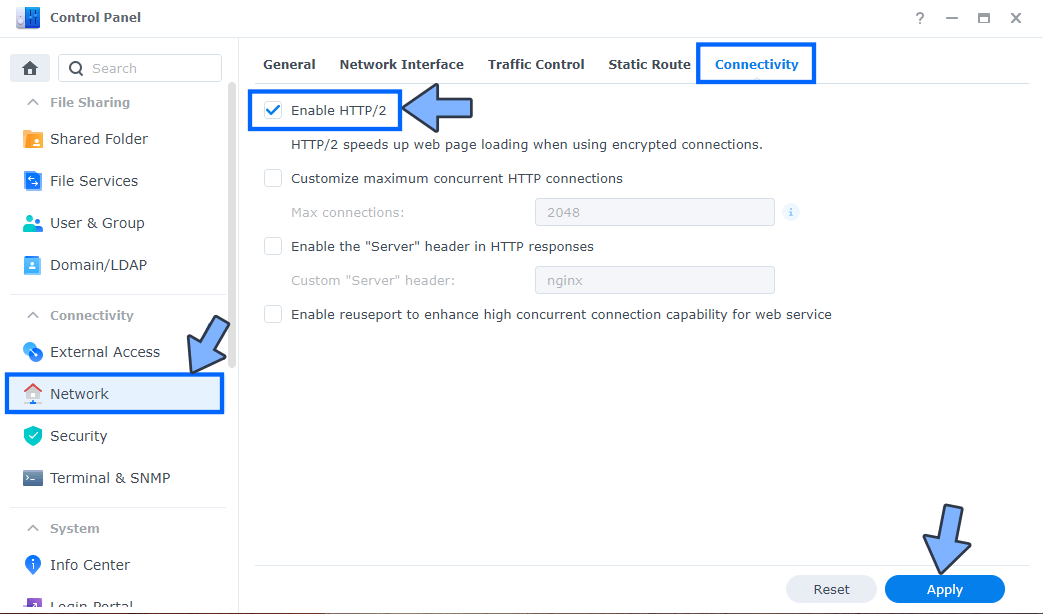
STEP 9
Go to Control Panel / Security / Advanced tab/ Check Enable HTTP Compression then click Apply. Follow the instructions in the image below.
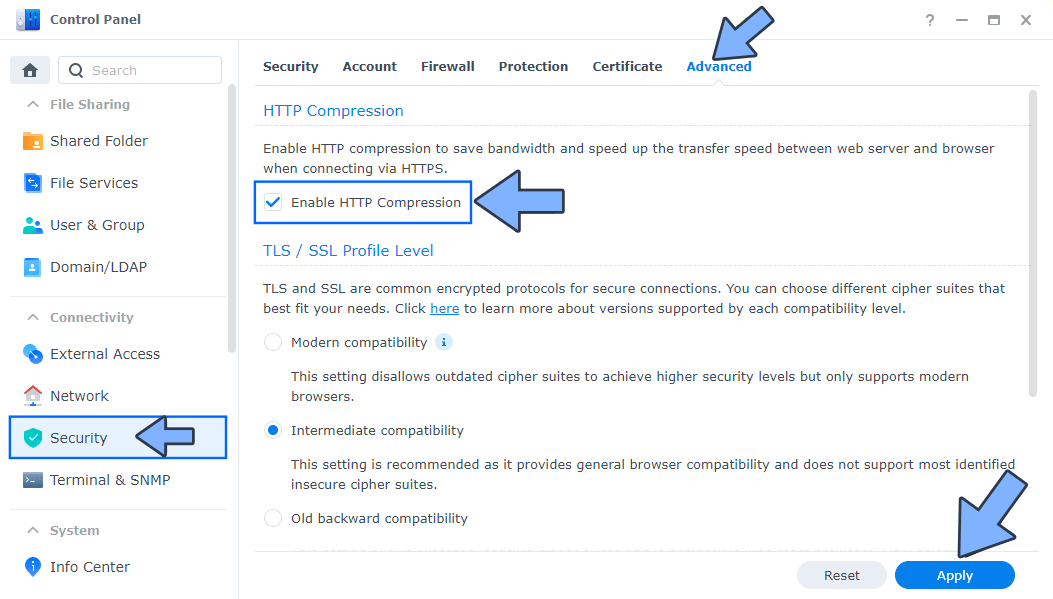
STEP 10
Go to File Station and open the docker folder. Inside the docker folder, create one new folder and name it itflow. Follow the instructions in the image below.
Note: Be careful to enter only lowercase, not uppercase letters.
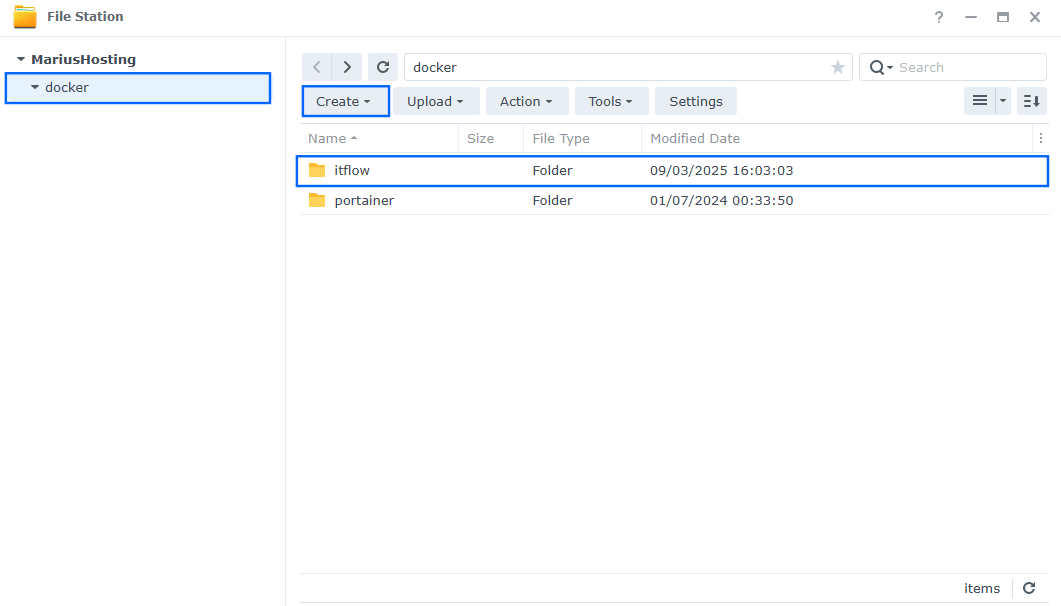
STEP 11
Now create three new folders inside the itflow folder that you have previously created at STEP 10 and name them data, db, entrypoint. Follow the instructions in the image below.
Note: Be careful to enter only lowercase, not uppercase letters.
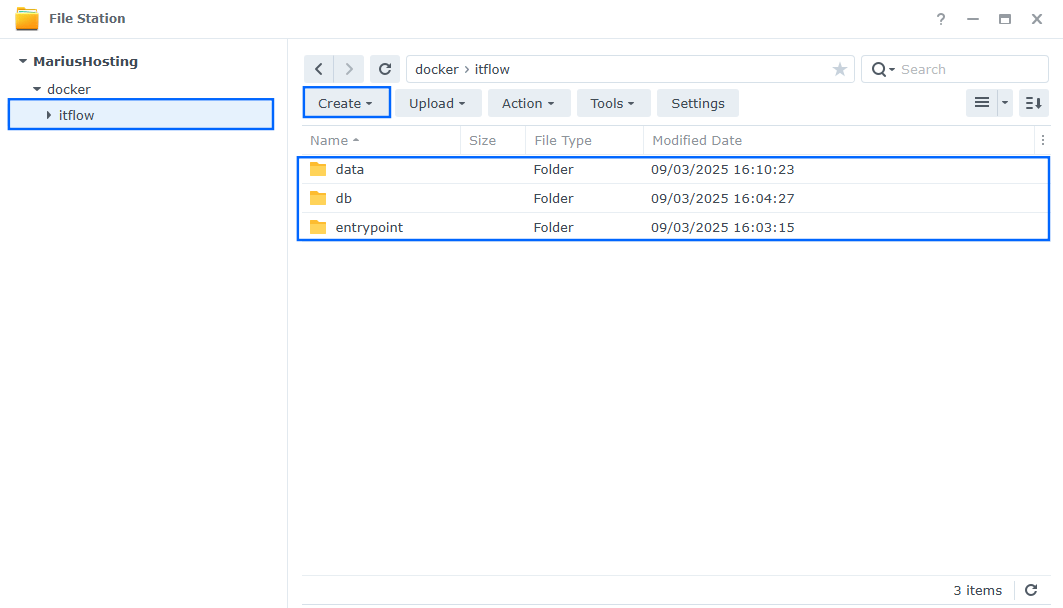
STEP 12
Download (click on the blue link below) and upload the entrypoint.sh file below in the entrypoint folder that you have previously created at STEP 11. Follow the instructions in the image below. 🔒Note: Support my work to unlock the password. You can use this password to download any file on mariushosting forever!
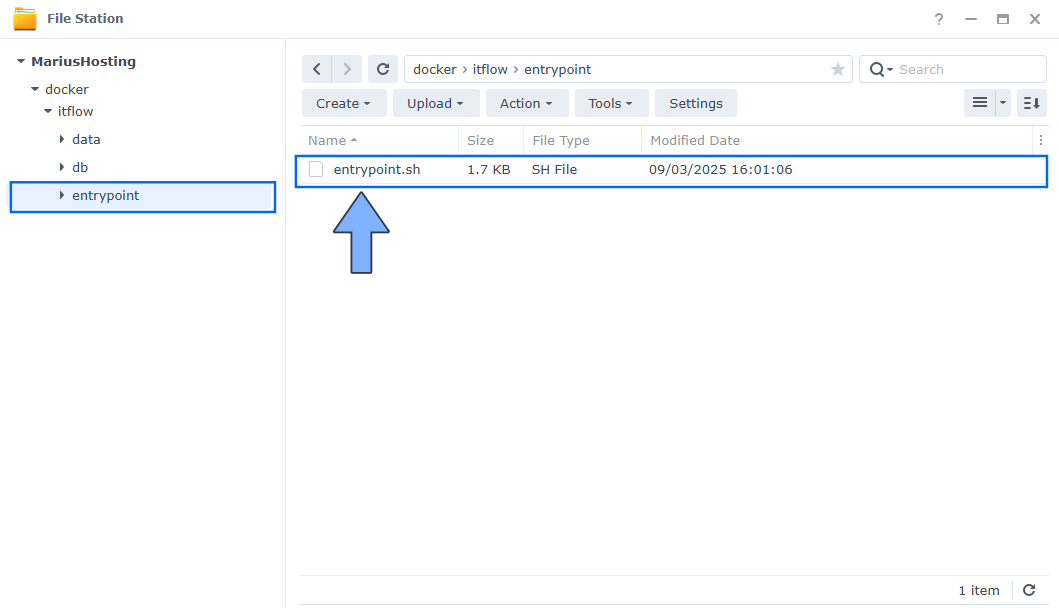
STEP 13
Log into Portainer using your username and password. On the left sidebar in Portainer, click on Home then Live connect. Follow the instructions in the image below.

On the left sidebar in Portainer, click on Stacks then + Add stack. Follow the instructions in the image below.

STEP 14
In the Name field type in itflow. Follow the instructions in the image below.
services:
itflow:
platform: linux/amd64
image: itfloworg/itflow:latest
container_name: ITFlow
healthcheck:
test: ["CMD-SHELL", "nc -z 127.0.0.1 8080 || exit 1"]
interval: 10s
timeout: 5s
retries: 3
start_period: 90s
ports:
- 8990:8080
environment:
TZ: Europe/Bucharest
ITFLOW_NAME: MARIUSHOSTING
ITFLOW_URL: itflow.yourname.synology.me
ITFLOW_REPO: github.com/itflow-org/itflow
ITFLOW_REPO_BRANCH: master
ITFLOW_PORT: 8080
ITFLOW_LOG_LEVEL: info
ITFLOW_DB_HOST: itflow-db
ITFLOW_DB_PASS: itflowpass
volumes:
- /volume1/docker/itflow/data:/var/www/localhost/htdocs:rw
- /volume1/docker/itflow/entrypoint/entrypoint.sh:/usr/bin/entrypoint.sh
depends_on:
- itflow-db
restart: on-failure:5
itflow-db:
image: mariadb:11.8-noble #LTS Long Time Support Until October 15, 2033.
container_name: ITFlow-DB
security_opt:
- no-new-privileges:false
hostname: itflow-db
environment:
MARIADB_DATABASE: itflow
MARIADB_USER: itflowuser
MARIADB_PASSWORD: itflowpass
MARIADB_RANDOM_ROOT_PASSWORD: true
TZ: Europe/Bucharest
volumes:
- /volume1/docker/itflow/db:/var/lib/mysql:rw
restart: on-failure:5
Note: Before you paste the code above in the Web editor area below, change the value for TZ. (Select your current Time Zone from this list.)
Note: Before you paste the code above in the Web editor area below, change the value for ITFLOW_URL and type in your own synology.me DDNS without https:// at the beginning that you have previously created at STEP 6.
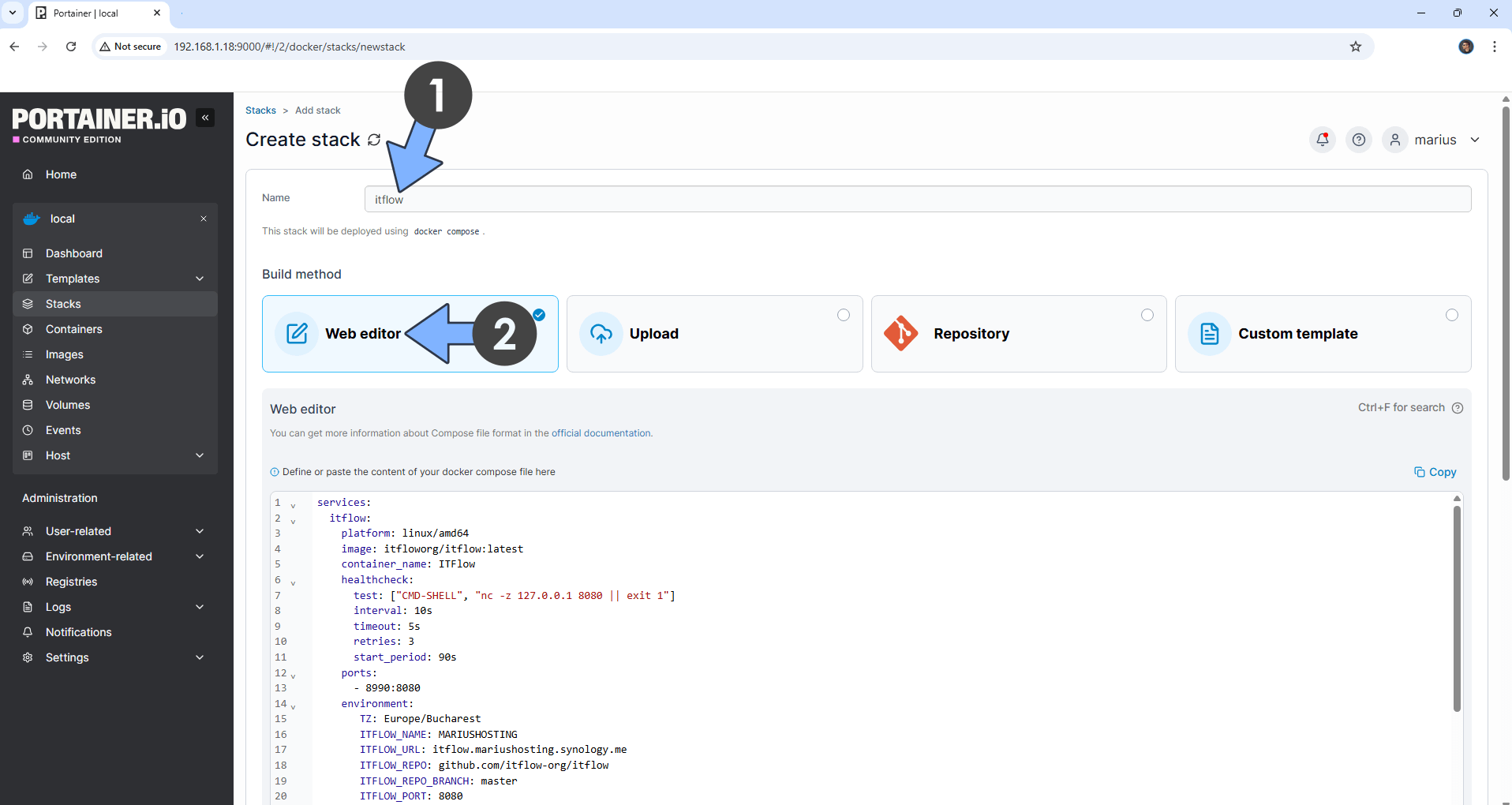
STEP 15
Scroll down on the page until you see a button named Deploy the stack. Click on it. Follow the instructions in the image below. The installation process can take up to a few minutes. It will depend on your Internet speed connection.
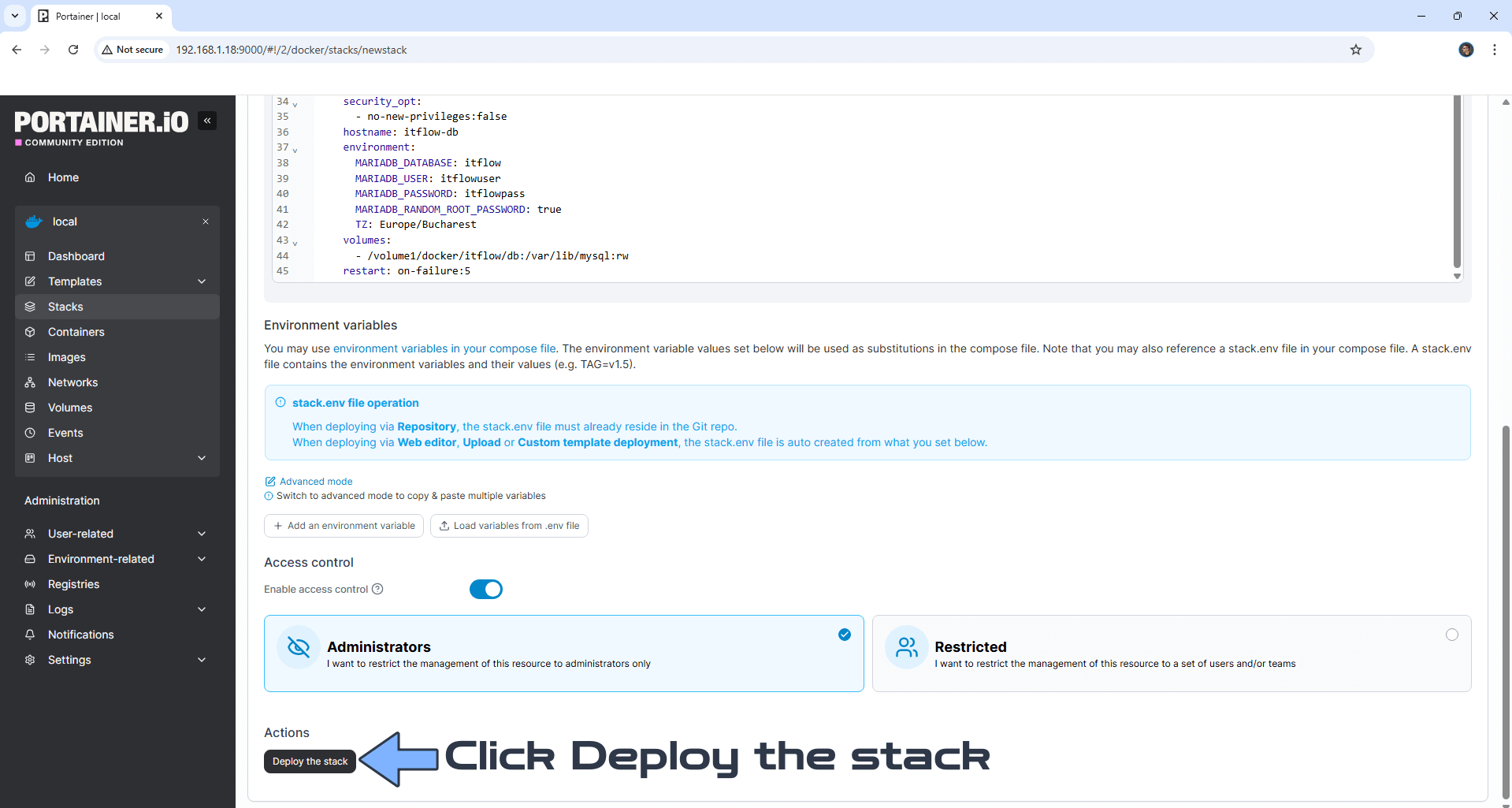
STEP 16
If everything goes right, you will see the following message at the top right of your screen: “Success Stack successfully deployed“.

STEP 17
🟢Please Support My work by Making a Donation. Almost 99,9% of the people that install something using my guides forget to support my work, or just ignore STEP 1. I’ve been very honest about this aspect of my work since the beginning: I don’t run any ADS, I don’t require subscriptions, paid or otherwise, I don’t collect IPs, emails, and I don’t have any referral links from Amazon or other merchants. I also don’t have any POP-UPs or COOKIES. I have repeatedly been told over the years how much I have contributed to the community. It’s something I love doing and have been honest about my passion since the beginning. But I also Need The Community to Support me Back to be able to continue doing this work.
STEP 18
Please wait approximately 2 minutes for the installation to be completed or you will get a blank page if you try to connect too soon. Now open your browser and type in your HTTPS/SSL certificate like this https://itflow.yourname.synology.me that you have previously created at STEP 6. In my case it’s https://itflow.mariushosting.synology.me If everything goes right, you will see the ITFlow setup page. Click Begin Setup. Follow the instructions in the image below.
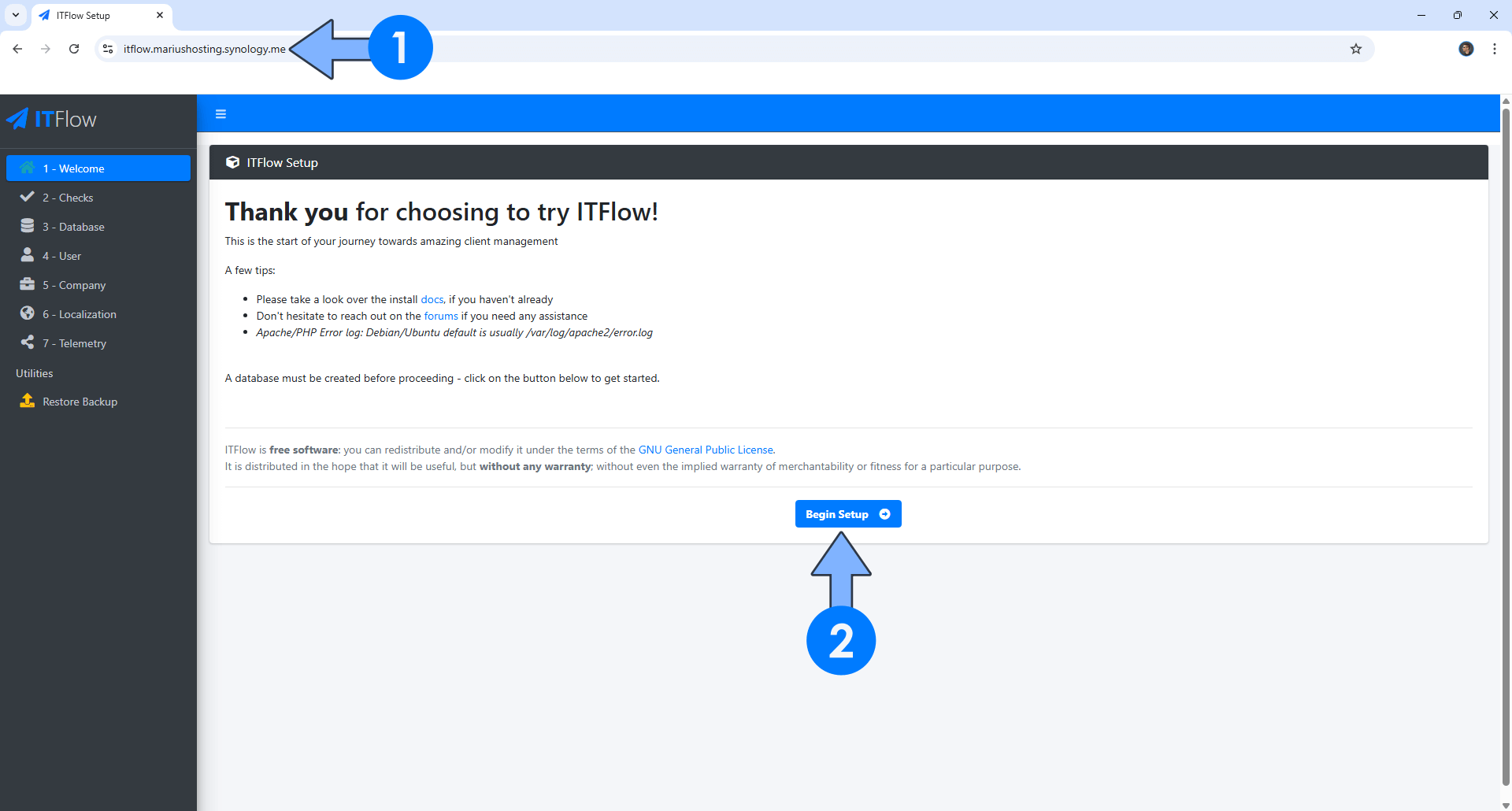
STEP 19
Click Next (Database). Follow the instructions in the image below.
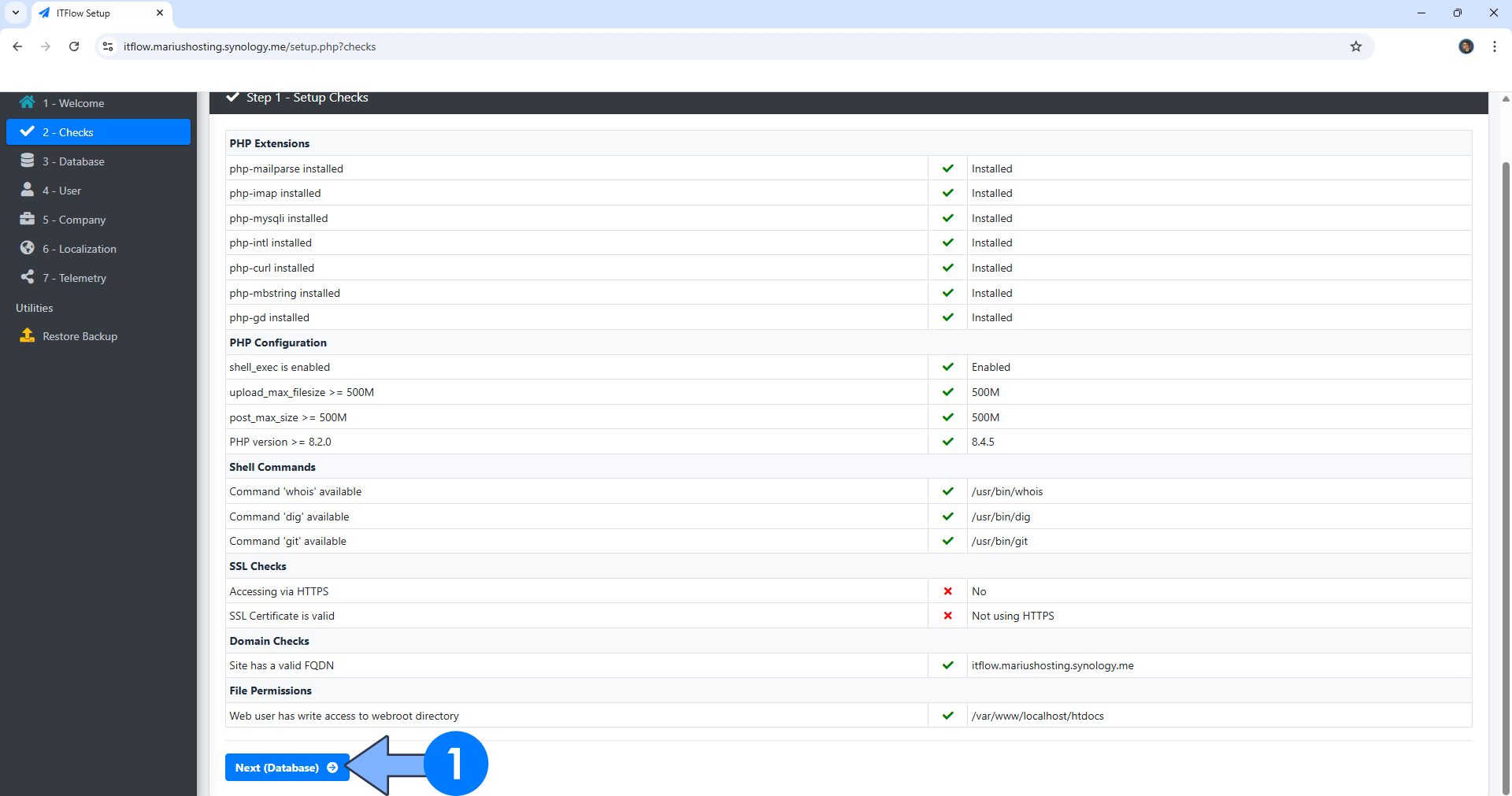
STEP 20
In the apposite fields, add the following data. Follow the instructions in the image below.
Database Name: itflow
Database Host: itflow-db
Database User: itflowuser
Database Password: itflowpass
Click Next (First User). Follow the instructions in the image below.
⚠️Warning: If you get connection issues, make sure Firewall RULE 6 has been added to your NAS Firewall configuration.
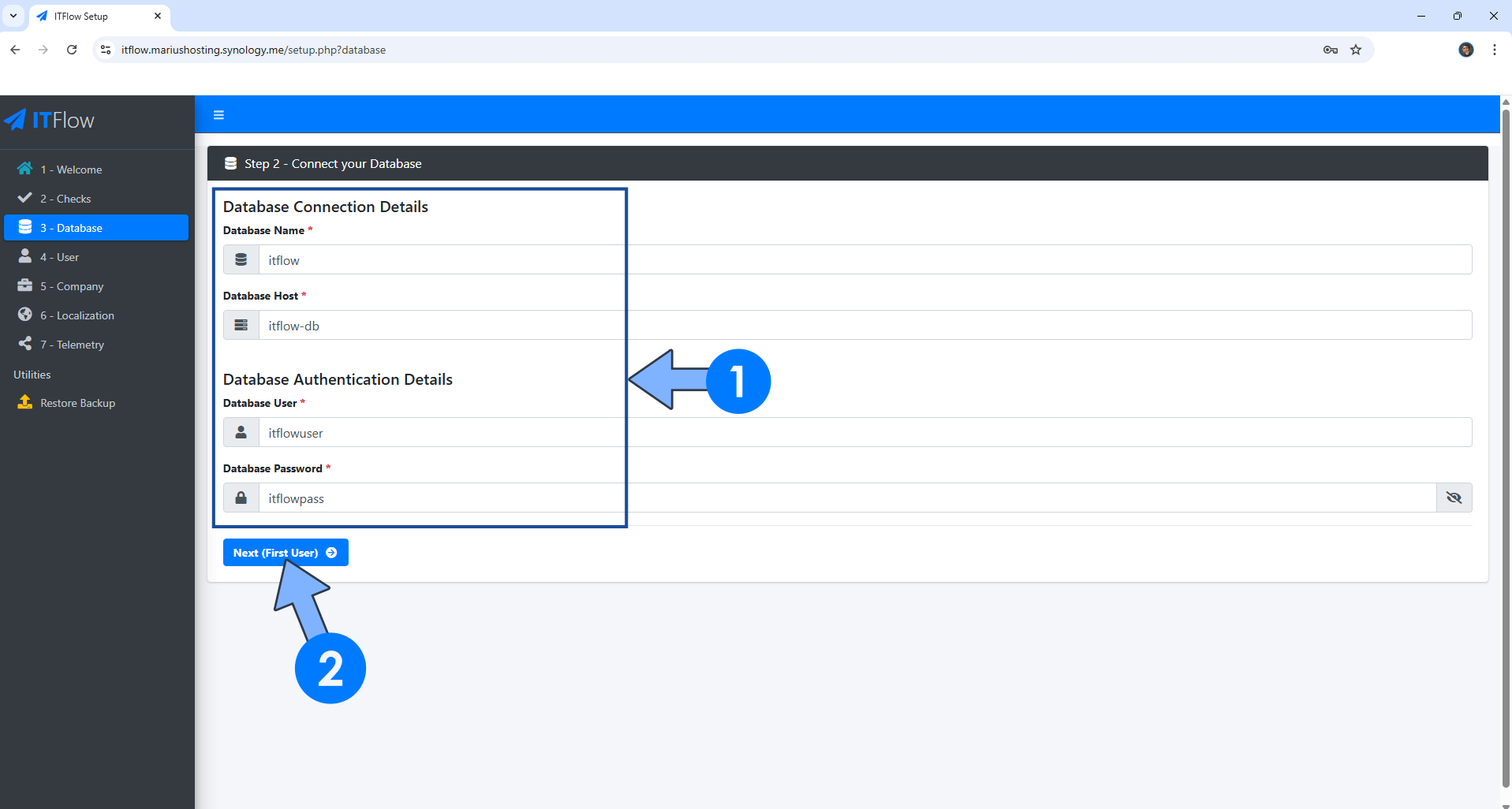
STEP 21
Create your Administrator. Type in your own Name, Email and Password. Upload your own Avatar. Click Next (Company details). Follow the instructions in the image below.
⚠️Warning: You will need this Email and Password later at STEP 25. So make sure you save them in a safe place.
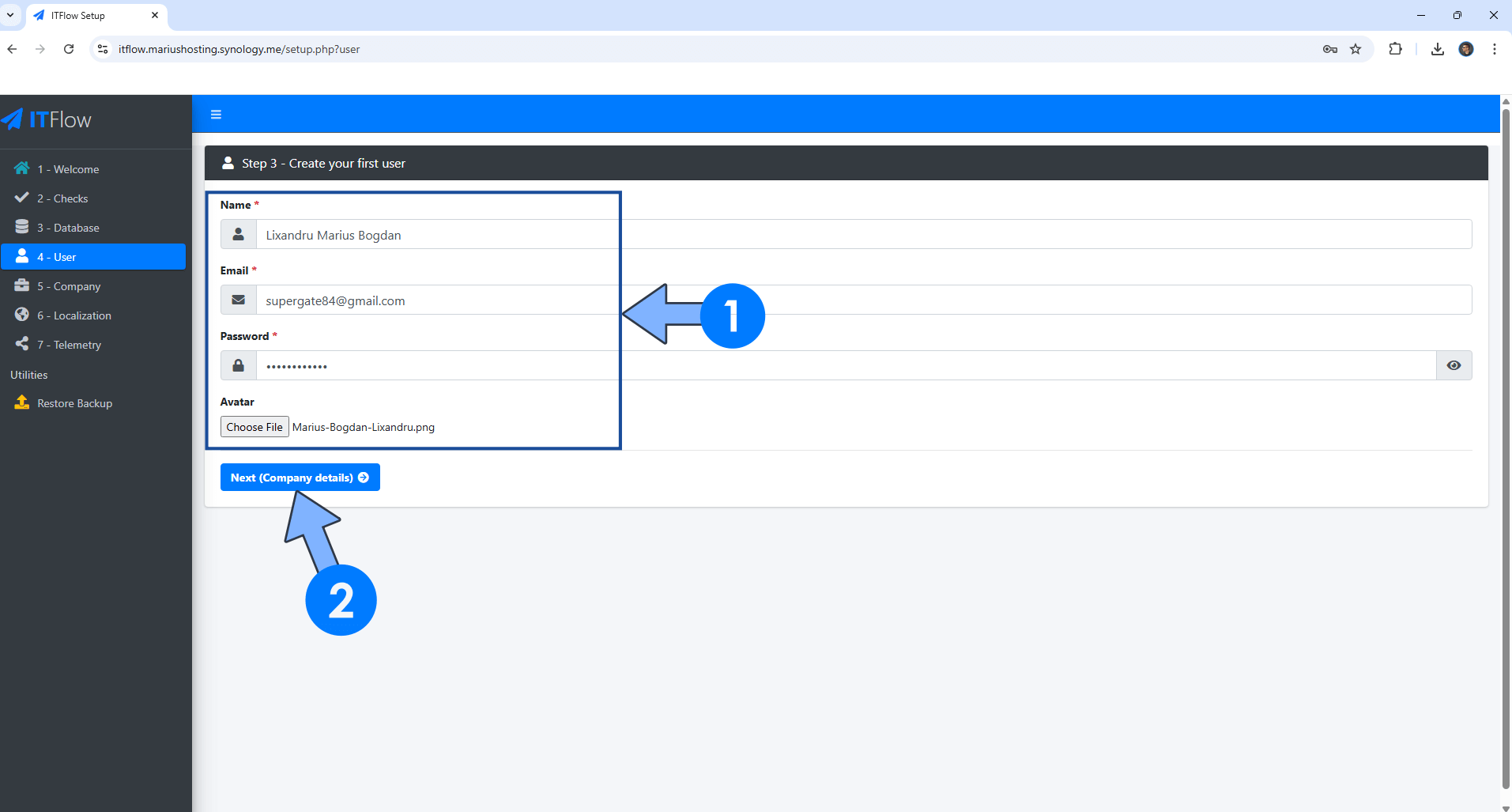
STEP 22
Add your own Company Details, then click Next (Localization). Follow the instructions in the image below.
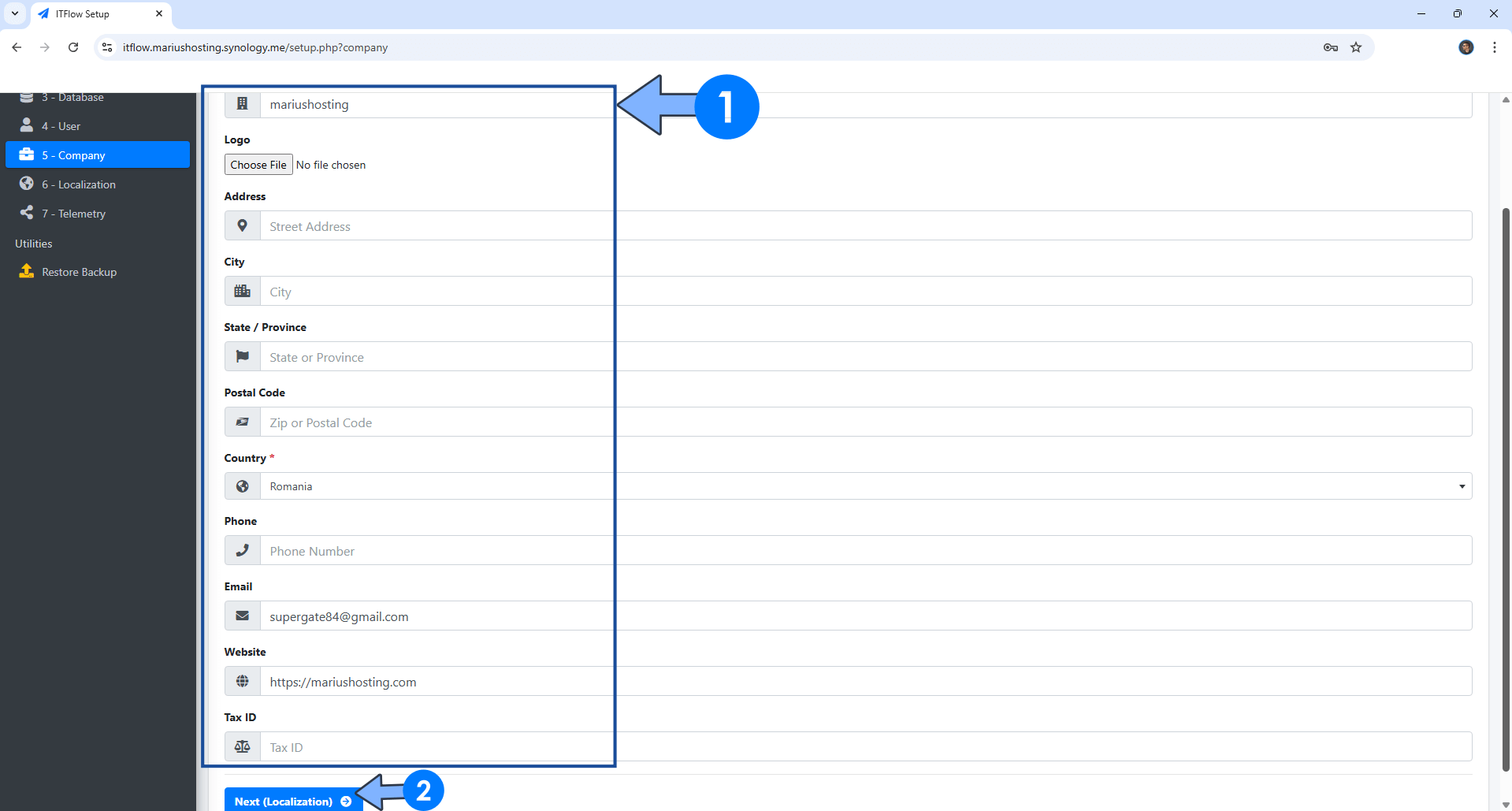
STEP 23
Select your favorite Language, Currency and Timezone. Click Next (Telemetry Settings). Follow the instructions in the image below.
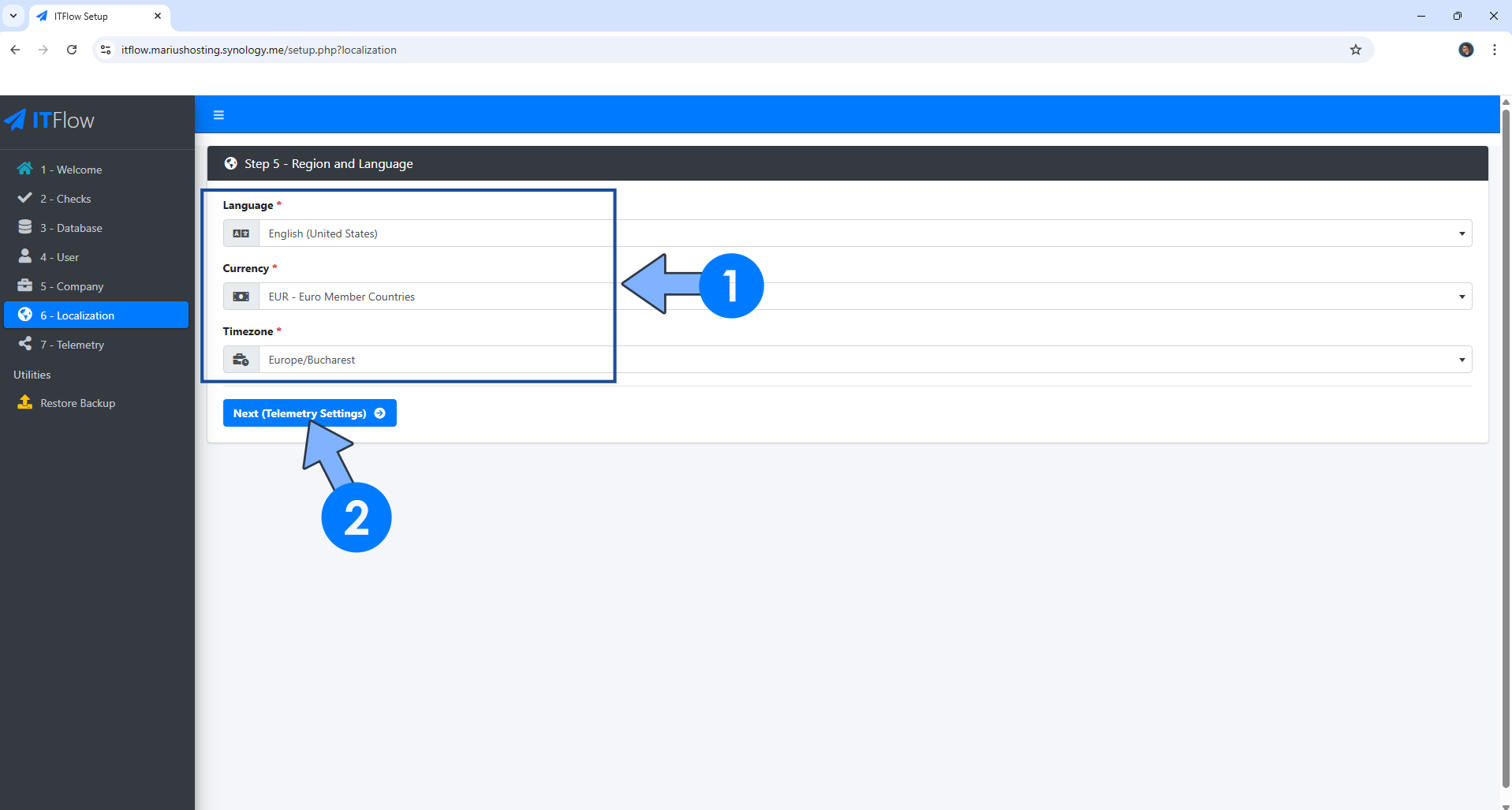
STEP 24
Click Finish and Sign in. Follow the instructions in the image below.
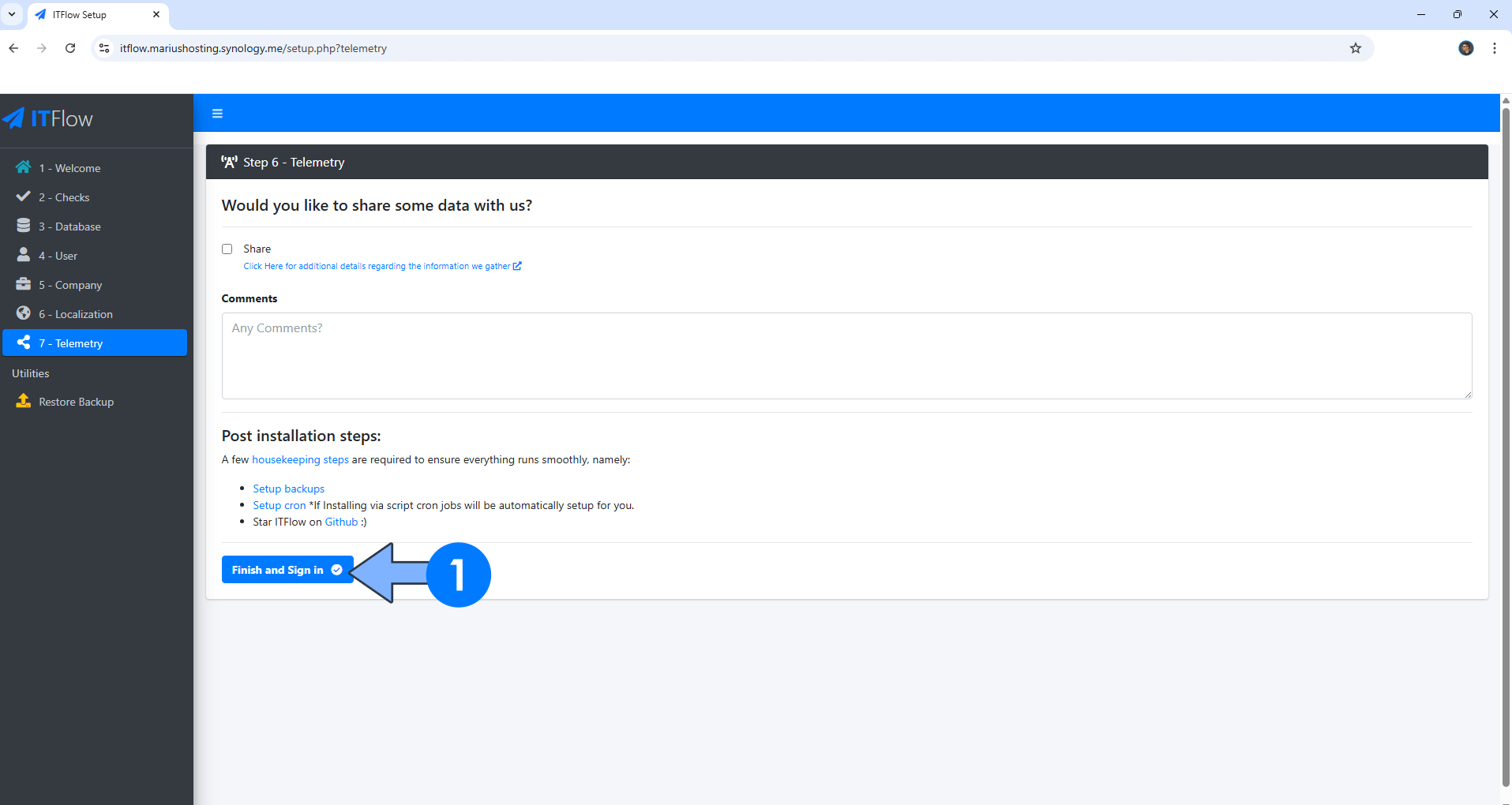
STEP 25
Type in your own Email and Password that you have previously added at STEP 21. Click Sign in. Follow the instructions in the image below.
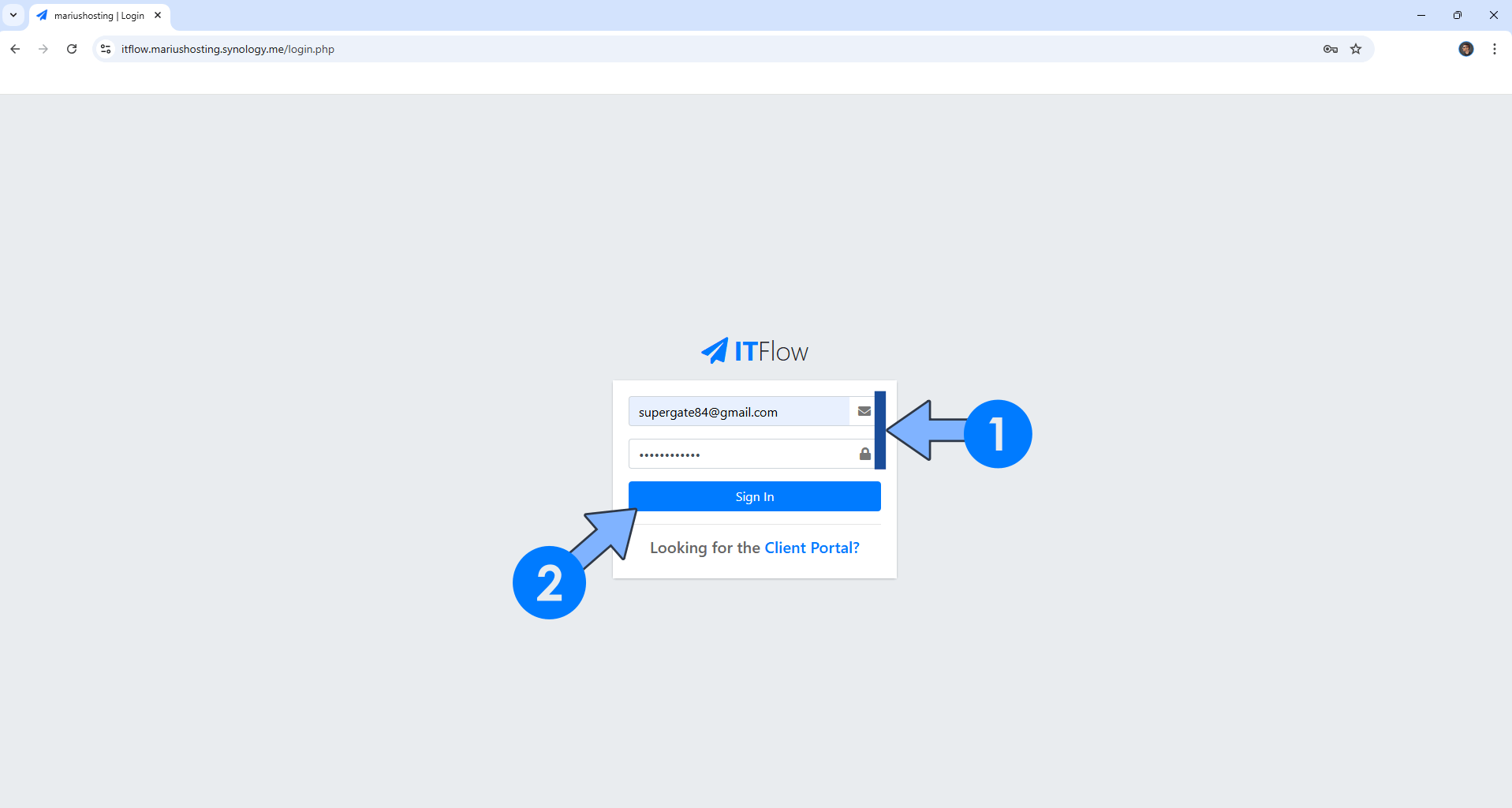
STEP 26
Your ITFlow dashboard at a glance!
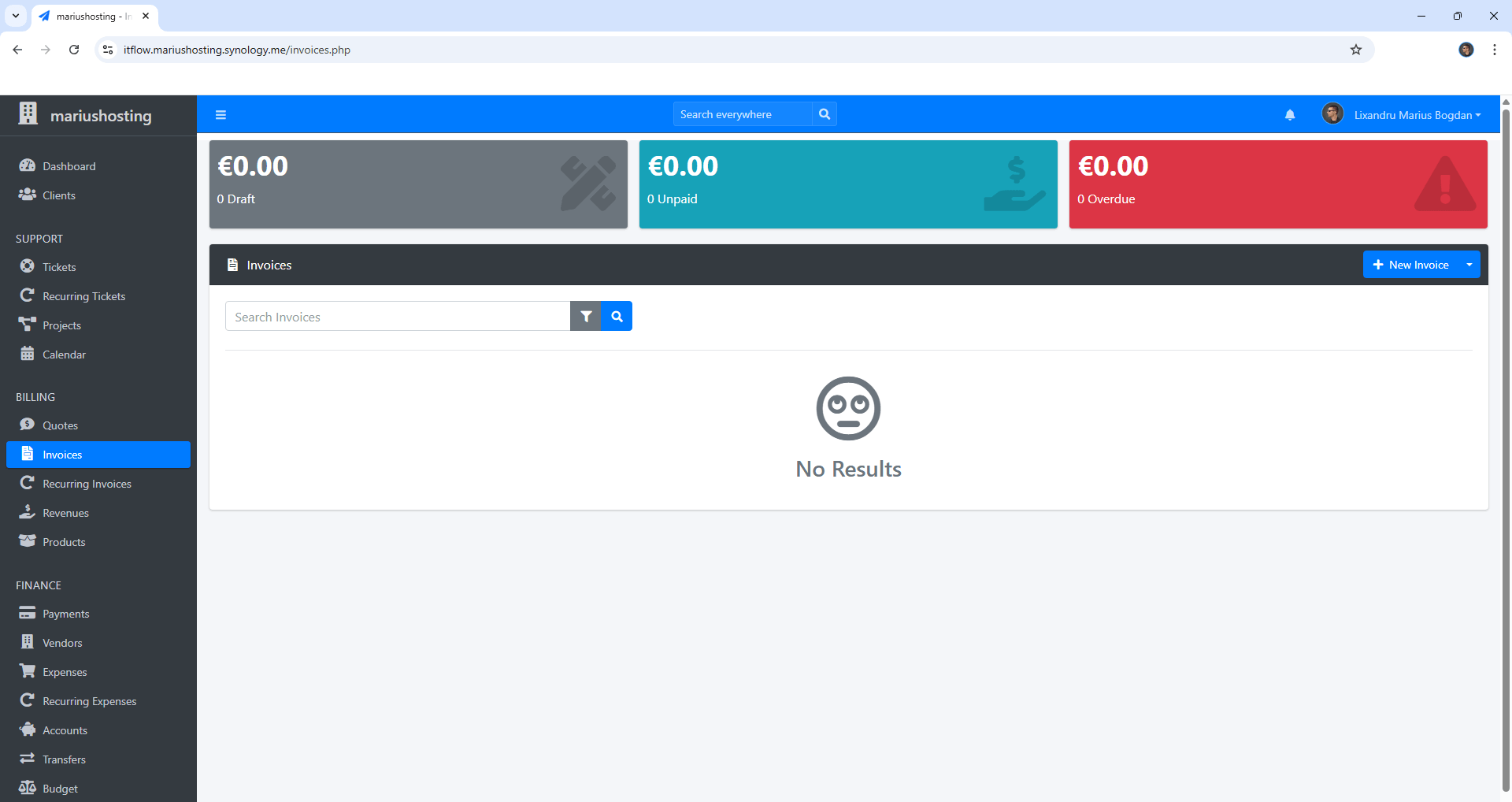
Enjoy ITFlow!
If you encounter issues by using this container, make sure to check out the Common Docker issues article.
Note: Can I run Docker on my Synology NAS? See the supported models.
Note: How to Back Up Docker Containers on your Synology NAS.
Note: Find out how to update the ITFlow container with the latest image.
Note: How to Free Disk Space on Your NAS if You Run Docker.
Note: How to Schedule Start & Stop For Docker Containers.
Note: How to Activate Email Notifications.
Note: How to Add Access Control Profile on Your NAS.
Note: How to Change Docker Containers Restart Policy.
Note: How to Use Docker Containers With VPN.
Note: Convert Docker Run Into Docker Compose.
Note: How to Clean Docker.
Note: How to Clean Docker Automatically.
Note: Best Practices When Using Docker and DDNS.
Note: Some Docker Containers Need WebSocket.
Note: Find out the Best NAS Models For Docker.
Note: Activate Gmail SMTP For Docker Containers
This post was updated on Thursday / February 5th, 2026 at 5:22 PM
